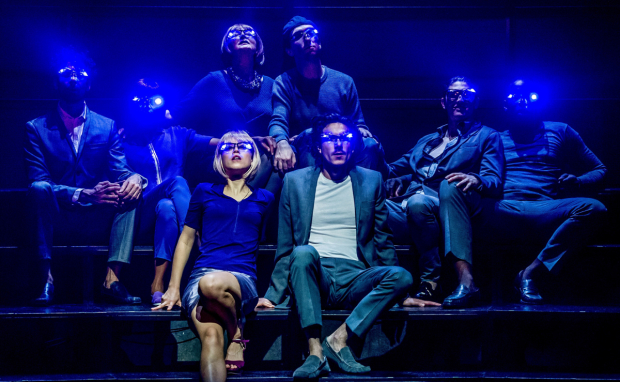Brave New World (Royal and Derngate, Northampton)
James Dacre directs the World Premiere of this adaptation of Aldous Huxley’s dystopian masterpiece

© Manuel Harlan
One future finishes, another one begins. Days after 1984 closed in the West End, Brave New World kicks off in Northampton – and, in all honesty, I find Aldous Huxley‘s vision of a world placated into productivity more persuasive than Orwell’s of compliance through fear. As Huxley later wrote to his former student, "the lust for power can be just as completely satisfied by suggesting people into loving their servitude as by flogging and kicking them into obedience."
Dawn King‘s stage adaptation emphasises the niceties of Huxley’s dazed dystopia: the consumerism, the promiscuity and the chemical highs. Everyone’s happy all the time: wanting for nothing they can’t have and conditioned to accept their lot in life, be they upper-caste alphas, bred for high-level, intellectual jobs, or dead-eyed epsilons, genetically engineered to operate lifts or stitch uniforms. It’s a work hard, play harder philosophy. After hours, everyone trots off to solidarity classes (think zumba orgies) or the feelies (multi-sensory films, mostly pornos), dosed up and blissed out on a drug known as soma.
The stage can reveal a story’s patterns, and King makes this a study of outsidership. Bernard Marx (Gruffudd Glyn), an alpha whose botched incubation left him with epsilon looks, desperately wants in to society’s upper echelons with its perks of promiscuity and respect – not least from pretty beta Lenina Crown (Olivia Morgan). His ticket comes in the form of John the Savage (William Postlethwaite, son of etc), a man raised in the old-school style, with parents and religion, who he brings back to civilisation. Raised reading Shakespeare, John speaks with feeling that this society’s missing – making celebrities of both men.
Bernard’s friend Helmholtz (Scott Karim), meanwhile, wants out: stops taking soma and dating, quits his job in emotional engineering in a bid to find meaning. Huxley’s genetic engineering and social conditioning is just a physical form of group-think and mass hypnosis – and both are as inescapable as each other.
James Dacre‘s production is as handsome as you could wish for. Keith Skretch‘s intricate video design – his first in the UK – does most of the legwork: providing video diaries, pervasive advertising and infographics with just the right lick of futuristic detail. Alongside Colin Grenfall‘s dynamic lighting, they bring Naomi Dawson‘s glossy design to life, allowing a stark juxtaposition between artifice and artefact.
An inspired electro soundtrack from post-punk, art-rockers These New Puritans, once described as "very 1970, but also very 1610, 1950, 1979, 1989, 2005 and 2070," gives the plot a real pulse. In a gaggle of good choices, they might be Dacre’s best.
Because King’s adaptation is best at its briskest: the more she pushes us through the plot, the less we snag on the pseudo-science and the social structure, neither of which entirely add up. Where the book takes its time, King’s précis leaves gaps and her characters don’t so much live in Huxley’s world as explain it. Sometimes they seem amazed by their everyday reality. Lenina marvels at a spoonful of synthetic food – the equivalent of being dumbstruck by a Pot Noodle. Details drop too: swap Huxley’s subliminal sleep lessons for aversion therapy, for example, and you return to a society governed by revulsion. Yet why would a world so set against pain – to the extent of eliminating the traumas of birth for all parties – shock its subjects into submission?
As a result, you never quite feel the sting of this dystopia and Huxley’s vision of the future never horrifies. Instead, it seems more like a satire on our present reality – a wry ‘look how things turned out.’ At a time when we’re handing our civil liberties over quite willingly, Brave New World should be more than that. It ought to appal.
Brave New World runs at Northampton Royal and Derngate until 26th September.












